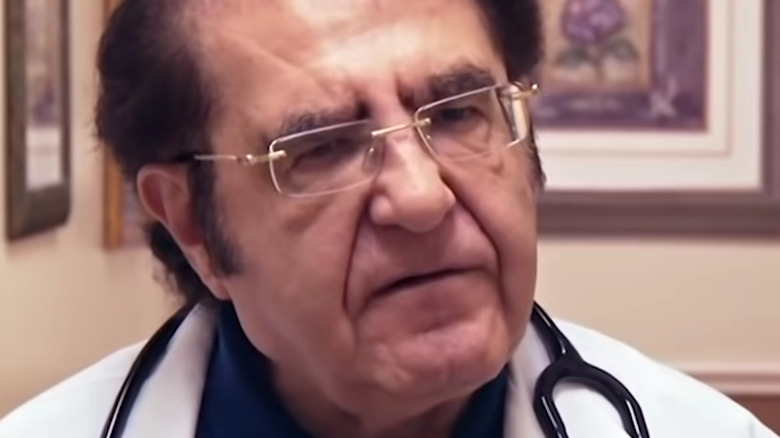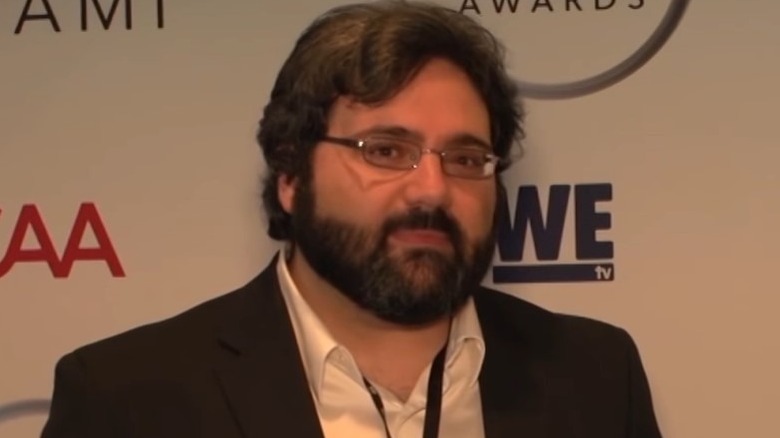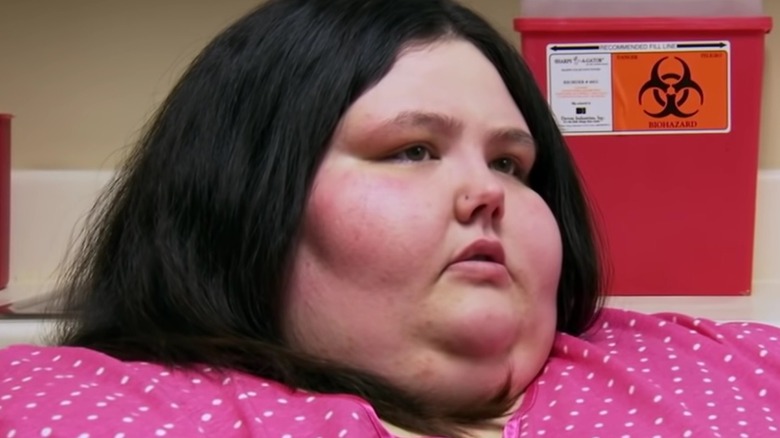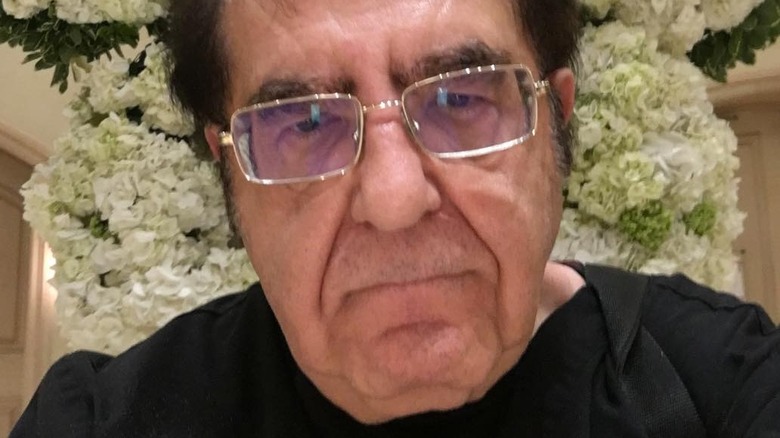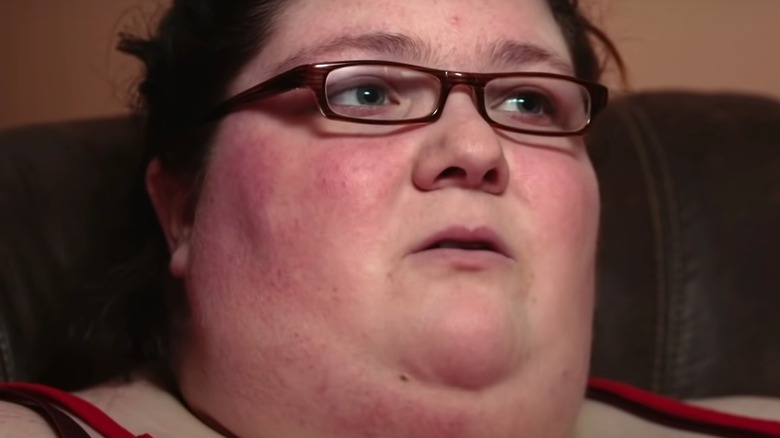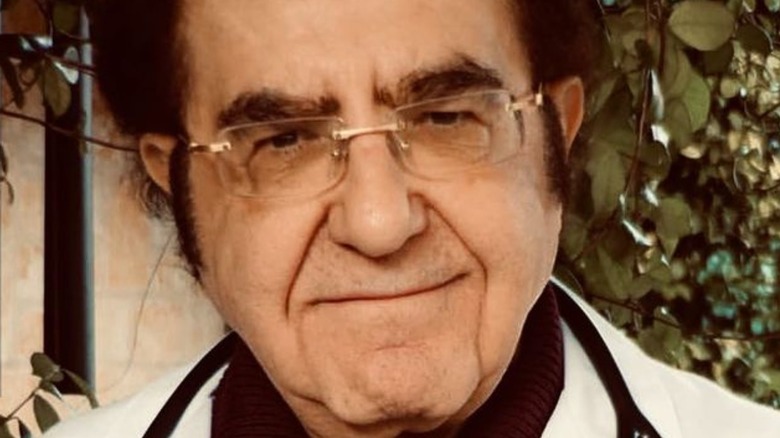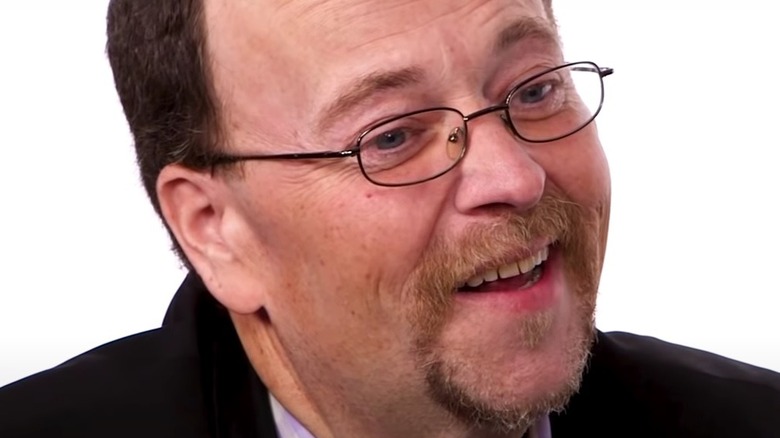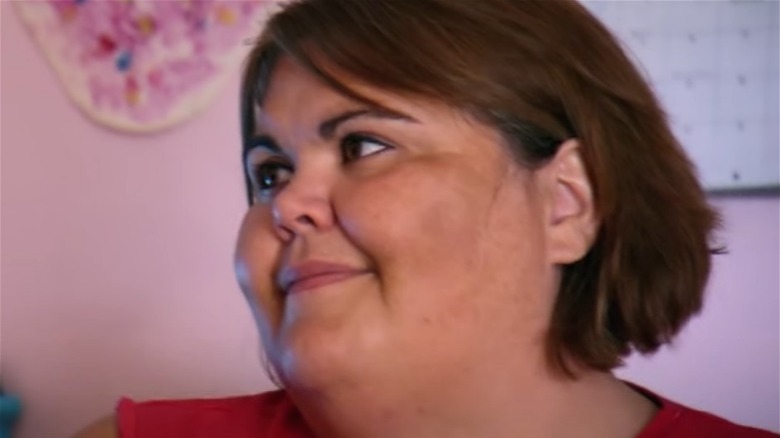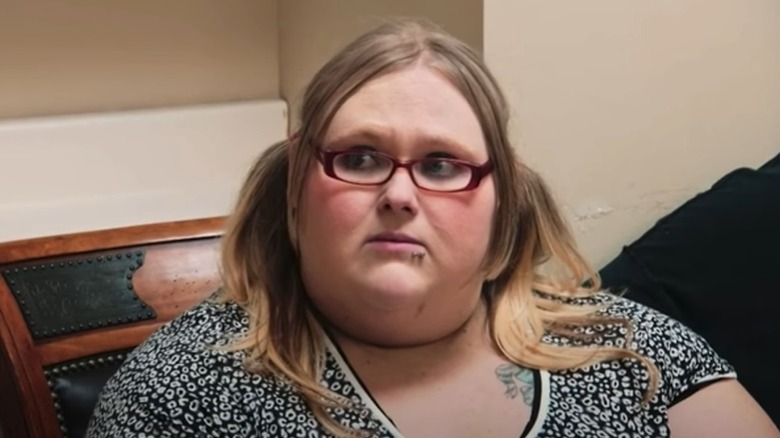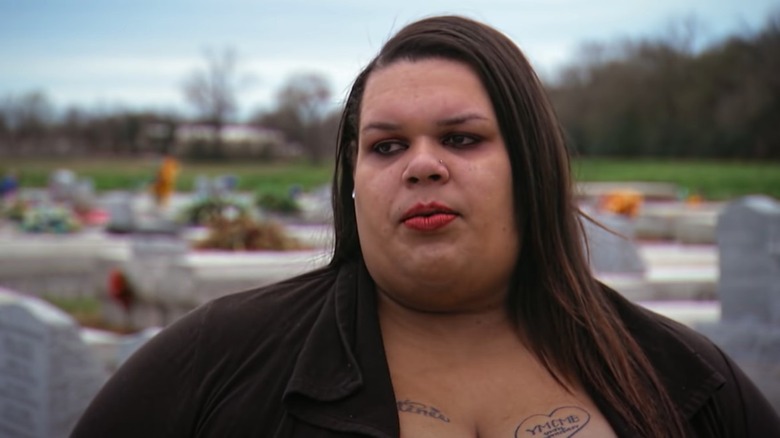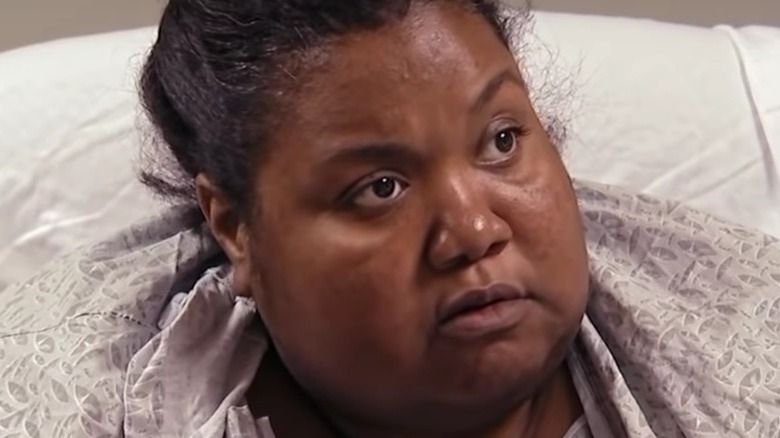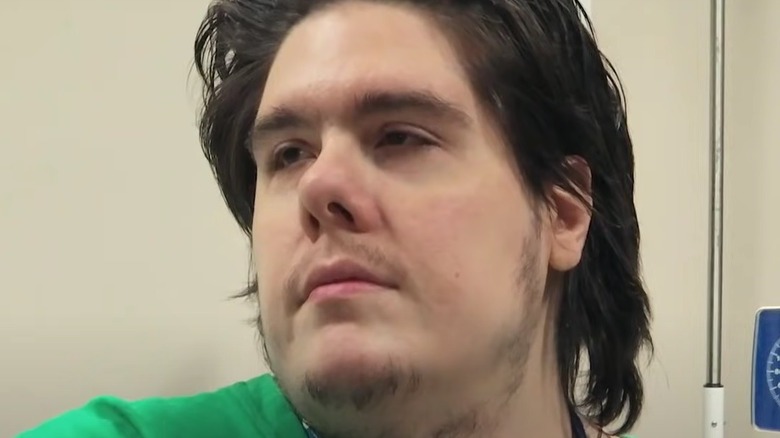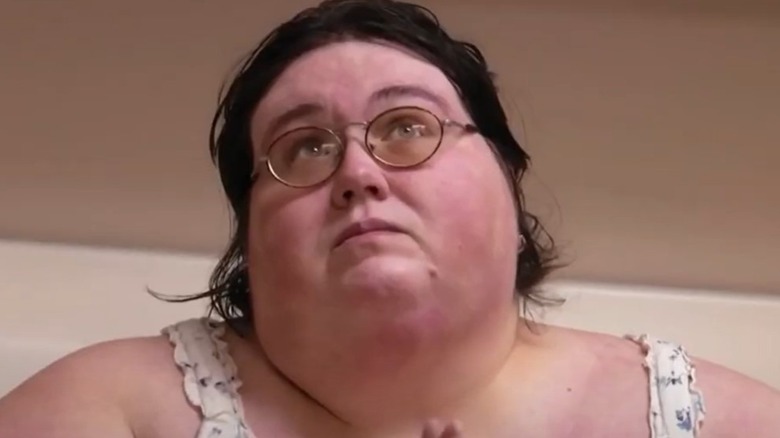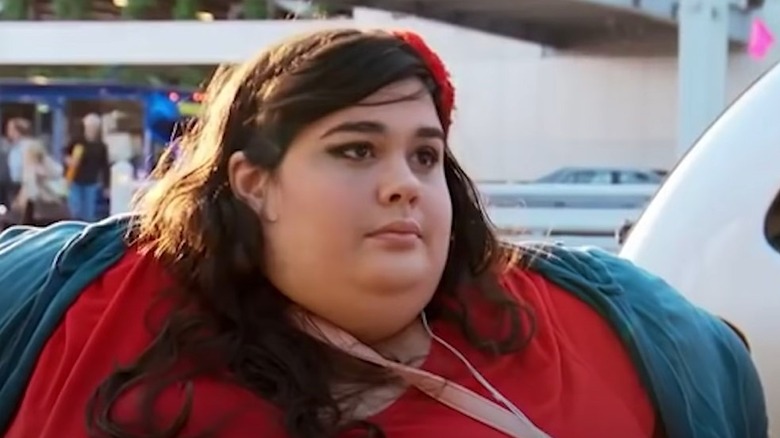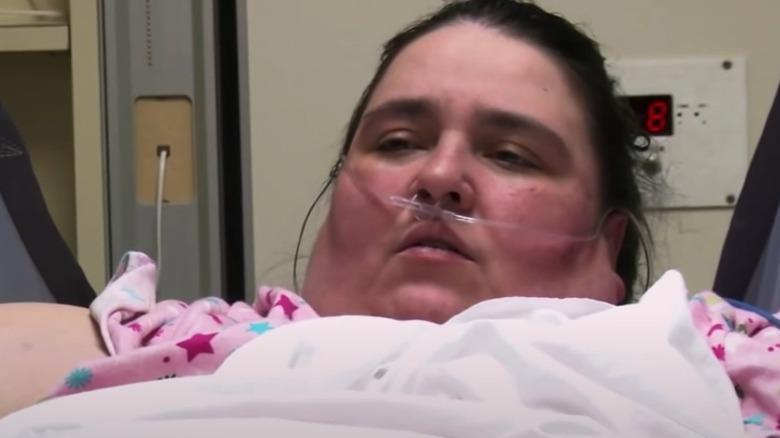What The Cameras Never Showed You On My 600-Lb Life
This article contains references to eating disorders, suicide, and child abuse.
However one may feel about the concept of weight loss for the sake of TV ratings, TLC's "My 600-Lb Life" is undoubtedly a success. Fans love nothing more than witnessing the dramatic transformations of the show's stars as they strive for personal happiness. Dr. Younan Nowzaradan, or Dr. Now, as he's best known, is the star of the show, aiding patients throughout their weight loss journeys.
But what we see on screen is not necessarily a reflection of reality, contrary to the moniker of "reality TV." Beneath the ostensible veneer of facilitating vulnerable people lurks a darker side to the popular series.
One of the most prominent criticisms levied at the show is claims of fatphobia. "My 600-Lb Life" feeds into public curiosity regarding food addiction, arguably using illness as entertainment. As NBC posits, TLC's "approach to entertainment seems often to embrace the presumption that fat is inherently precarious and undesirable — and yet also worthy of constant surveillance. Fat people are curiosities to be probed and displayed for nonfat people." Accordingly, fatphobia is central to many of the show's dark behind-the-scenes secrets.
While viewers see patients receiving medical care of the utmost quality, many have claimed that their experiences away from the cameras couldn't be further from these idealized on-screen snippets. So, without further ado, here's what the cameras never showed you on "My 600-Lb Life."
If you are struggling with an eating disorder, or know someone who is, help is available. Visit the National Eating Disorders Association website or contact NEDA's Live Helpline at 1-800-931-2237. You can also receive 24/7 Crisis Support via text (send NEDA to 741-741).
Dr. Now's son is the brains behind the show
Dr. Nowzaradan may be the star of "My 600-Lb Life," but it is actually the doctor's son, Jonathan, who created the show. The younger Nowzaradan was the executive producer behind the 2008 British documentary "Half Ton Mum," which was a precursor of sorts to "My 600-Lb Life." In fact, he produced a bunch of food addiction-related shows prior to the hit TLC series, per his IMDb profile.
Speaking with The Austin Chronicle in 2007, Jonathan discussed the inspiration behind his approach to low-key documentary filmmaking, which would go on to influence the premise of "My 600-Lb Life." "It's fine to make some money," he explained, "but media can be used for so much more, to communicate a lot of good things, to encourage, to inspire."
At the time, the younger Nowzaradan had just begun filming "Half Ton Mum," which focused on the life of Renee Williams, who died following a bypass operation, per The Guardian. When making the documentary, Jonathan utilized his father's position as a weight loss specialist to his advantage. "The people who are over 700 pounds think that they're the only person on the planet like that," Jonathan explained of his motivation. "But there are millions, some people suspect in the tens of millions, of people in America. We want them to know that not only are they not alone, but there are doctors who will help. Don't give up, and don't just decide to die."
If you are struggling with an eating disorder, or know someone who is, help is available. Visit the National Eating Disorders Association website or contact NEDA's Live Helpline at 1-800-931-2237. You can also receive 24/7 Crisis Support via text (send NEDA to 741-741).
The show is heavily edited
The line between fake and fact is often blurred when it comes to reality TV. For instance, do we really believe that infamous Kardashian Bentley fight wasn't just a tiny bit staged? Subsequently, there have long been rumors that aspects of "My 600-Lb Life" may be heavily fabricated. And it appears that this has been confirmed by some of the show's stars.
According to Christina Phillips, who appeared in the second season, producers thoroughly edit the show to suit their agenda. When asked whether she now regretted aspects of her appearance on "My 600-Lb Life," Christina told Starcasm, "I use to because I was young and didn't realize that the show would be edited in ways that weren't exactly true. I had some hate in the beginning and it was because people didn't know the whole truth."
Unfortunately, reality TV contestants receiving online abuse is far too common, despite the fact that all the contestants on "My 600-Lb Life" are living with serious medical conditions. Thus, the producers' alleged decision to purposely falsify what occurs on screen may be partly responsible for the skewed public perception of patients. However, Christina has learned not to let the haters faze her. "I could explain myself to others until I was blue in the face and it still wouldn't change anything. I am glad to finally be at the point in my life where other people's opinion of me doesn't matter," she told Starcasm.
The show faced coronavirus criticism
When the entire country had shut down due to the coronavirus outbreak in March 2020, numerous TV and film productions halted their projects until it was safe to continue working again. Somewhat startlingly, this was not the case for "My 600-Lb Life." Filming for the show was still underway at a time when evading social distancing advice would be extremely detrimental to the patients who appear on the series, many of whom have medical conditions that increase their risk of suffering severe illness from the virus.
This decision to keep the cameras rolling led to heavy criticism from insiders, as cast members reportedly expressed their anxiety about filming a TV show during a pandemic. "These castmembers have a compromised immune system already. They're not OK. They're not feeling comfortable," a source told The Hollywood Reporter. "It's super dangerous and none of us wants to be the person who gives it to the castmember." Even more damningly, sources told the publication that many crew members feared speaking out about the precarious working conditions due to a fear of getting fired.
NBC News argued that the production team's commitment to continue filming despite Austin, Texas' "Stay Home — Work Safe" public order was indicative of the producers' callousness towards the wellbeing of its stars. As such, the publication posits the patients are viewed as mere vessels for entertainment, thereby "proving how powerful our fatphobic curiosity truly is." Eventually, the series did postpone filming towards the end of March 2020.
A lack of psychological evaluation
Food addiction is a serious illness, and Dr. Now's tough love approach is not always the most beneficial for those with psychological disorders. As Psychology Today notes, compassion, as opposed to tough love, is key to addiction recovery: "Any addiction –- to food, to a substance, or to love –- is chronic ... These are not problems that can be solved on a superficial level." Subsequently, some former stars of "My 600-Lb Life" have accused producers of overlooking their psychological wellbeing for the sake of raking in more views.
In 2021, Gina Marie Krasley, who appeared in Season 8, died aged just 30. Prior to her death, she was in the midst of suing the show's producers for over $1 million, per E!. In a series of explosive allegations, Gina said that the producers deliberately made her eat vast quantities of food to depict her in a negative light for the purpose of entertainment, putting her health at risk as a result. She also alleged that she did not receive any psychological evaluation prior to her appearance on the show, whose producers allegedly went "beyond all possible bounds of decency."
As Variety notes, Gina's food addiction stemmed from childhood abuse, which resulted in psychological issues; essentially, she used food as a coping mechanism for her trauma. Her family also encouraged people to donate to mental health charities following her death. Accordingly, the late star's lawsuit paints the show's producers in a highly damaging light indeed.
If you are struggling with an eating disorder, or know someone who is, help is available. Visit the National Eating Disorders Association website or contact NEDA's Live Helpline at 1-800-931-2237. You can also receive 24/7 Crisis Support via text (send NEDA to 741-741).
If you or someone you know may be the victim of child abuse, please contact the Childhelp National Child Abuse Hotline at 1-800-4-A-Child (1-800-422-4453) or contact their live chat services.
Dr. Now has a shady past
He may come across as the affable doctor-next-door, but Younan Nowzaradan has been involved in multiple malpractice cases away from the camera. He was even accused of leaving foreign objects in a patient's stomach.
Before he became a star on "My 600-Lb Life," Nowzaradan was sued by the mother of a patient who died under his care following weight loss surgery in 2005. Colleen Shepherd alleged that her daughter Tina "was not prompted from a psychological standpoint to know the risks involved when you are grossly overweight" ahead of the procedure, per Chron. And the lawsuits didn't end there.
As reported by Radar Online, Nowzaradan performed laparoscopic surgery on a patient in 2015, and "Within days of the procedure, plaintiff developed persistent extreme abdominal pain and pressure to her lower abdomen inconsistent with post-operative pain." The doctor had allegedly left a segment of tubing and a "stainless steel connecter" in the stomach of the patient, who subsequently sought over $200,000 for medical negligence. The lawsuit was ultimately dismissed.
Then, in 2018, Nowzaradan was hit with yet another lawsuit when a patient claimed that they had been left "deformed" and in "extreme pain" after a botched abdominal surgery, per Radar Online. The individual requested $1 million in compensation. "The plaintiff no longer has a navel, as a result of the procedure," the lawsuit stated. "The plaintiff's abdomen is deformed." Again, the case was eventually dropped.
Patients aren't paid royalties
Dr. Now may have a whopping $6 million net worth, per Wealthy Persons, but the patients featured on "My 600-Lb Life" aren't so handsomely rewarded for subjecting themselves to the glare of the reality TV cameras, not to mention the judgment of the general public.
While patients are paid an initial $1,500 "flat appearance fee" and $2,500 to relocate to Houston, unlike TV actors who can profit off of their reruns, "My 600-Lb Life" stars are not paid any royalties, per Starcasm. Many of them cannot live on the few thousand dollars that they are given, so some have taken to writing about their experiences on the show to make extra cash. Chad Dean, who appeared on Season 4, wrote a memoir titled "I'm in Here Somewhere: Memoir of a Food Addict," in which he capitalized on the success of his stint on the show. "By the time my follow-up episode aired, I'd gathered a pretty large following on Facebook," he told The Ashley's Reality Roundup. "Soon, I began receiving messages [from fans who said] that they would love to know more about my life and that I should write a book."
Nevertheless, the show does pay for its stars' weight loss surgery, which is undoubtedly a huge plus. As Chad admits, "Without [the show] I would be dead."
Some patients are encouraged to remain unhealthy by their partners
Although "My 600-Lb Life" covers many causes of food addiction, there is a NSFW reason behind some of the patients' sizes that isn't properly explored. The phenomenon known as "feederism," whereby someone purposely overfeeds their partner, is responsible for certain stars' weight.
For instance, Zsalynn Whitworth, who was featured in Season 2, was encouraged to eat excessively by her husband Gareth. But that's not all. Prior to her appearance on the show, Zsalynn appeared on adult fetish sites to help fund her weight loss surgery. As she revealed in the documentary "All of Me" (via ABC News), her husband had been "shopping for a fat girl" online when they met, illustrating the commodification of what she described as "bigger than just fat" bodies by certain men, none of which is covered comprehensively on "My 600-Lb Life."
Zsalynn has said that while her ex was depicted in a negative light, the series did not adequately reveal the extent of his controlling behavior. "I know a lot of people have had questions about if my husband is really as awful in real life or if it was just editing, but to be honest, editing made him look like an angel," she said on a "Where Are They Now?" episode of the show, per Starcasm. "I feel like he loves me in the only way he knows how. I feel like I probably deserve a different kind of love." And she was right — Zsalynn divorced her husband and found love with a new man.
If you are struggling with an eating disorder, or know someone who is, help is available. Visit the National Eating Disorders Association website or contact NEDA's Live Helpline at 1-800-931-2237. You can also receive 24/7 Crisis Support via text (send NEDA to 741-741).
Patients find certain scenes humiliating
As with many reality shows, "My 600-Lb Life" relies on a substantial element of shock value to draw in viewers. Most notably, the series is famed for its uncomfortable and explicit shower scenes, reducing patients with food addiction to a vulnerable state of undress. Many stars have called out the producers for allowing such scenes, branding them humiliating.
In a succession of graphic shots, Nicole Lewis was shown being hosed off then patted dry with talc by her boyfriend during her Season 5 appearance. She told Rover Radio that she was initially reluctant to film the scenes and was pushed into disagreeable scenarios out of fear of being denied treatment. "Oh my goodness, I was definitely embarrassed. ... I know I needed help, and my main focus was to do it for my children," she explained. "And so when they came to my house, they were like, 'Okay, we have to do a shower scene and do real-life stuff for real and for you to be a part of this process.'" After debating whether to allow the crew to film such a private moment, she decided, "It was either me not let them do that and not get the help and possibly not be around another year or just let it happen and get the help from the doctor."
Meanwhile, Season 3's Pauline Potter told CNN that her experience was "a little bit degrading," but she felt the risk was worth it.
If you are struggling with an eating disorder, or know someone who is, help is available. Visit the National Eating Disorders Association website or contact NEDA's Live Helpline at 1-800-931-2237. You can also receive 24/7 Crisis Support via text (send NEDA to 741-741).
Claims of bigotry
In Season 7, viewers were treated to one of the most moving "My 600-Lb Life" episodes to date, in which Destinee Lashaee, who had come out as a trans woman, was enabled to live her truth through gastric sleeve surgery. But while Destinee's journey is portrayed as inspiring on-screen, her experience away from the cameras was allegedly one of shocking bigotry.
As reported by The Sun, Destinee claimed in a lawsuit that the producers were transphobic and forced her "to shave her face" on camera. "The filming of her shaving was so painful that it was not made part of the show. The stress led Plaintiff to have a breakdown in which she kicked the producers out of her home, and threatened to kill them and herself," she alleged in legal documents.
Additionally, she claimed that the show's purported interest in patients' psychological wellbeing is a mere facade and that she was only given a single session in therapy "so that it could be filmed and be part of the show." This substantiates previous claims of the show's commitment to patients' mental health being nothing more than showbiz artifice. In her legal filings, Destinee sought $1 million in damages.
She isn't the first person to sue the show over claims that producers lied. In 2020, Starcasm reported that the family of LB Bonner, who was featured in Season 6 and later died by suicide, sued the producers, claiming that he was also only given just "one therapy session," contrary to their promises.
If you or a loved one has experienced a hate crime, contact the VictimConnect Hotline by phone at 1-855-4-VICTIM or by chat for more information or assistance in locating services to help. If you or a loved one are in immediate danger, call 911.
If you or anyone you know is having suicidal thoughts, please call the National Suicide Prevention Lifeline at 1-800-273-TALK (8255).
Almost a dozen patients have died
One of the show's darkest secrets is that a shocking number of "My 600-Lb Life" stars — 11 as of this writing — have died following their appearances on the show.
The first was Season 1's Henry Foots, who died in 2013 from undisclosed causes, per Click2Houston. Then, in 2017, Robert Buchel died during the filming of Season 6. He suffered a heart attack before undergoing weight-loss surgery, according to The Washington Post.
Another Season 6 star, Lisa Fleming, died a year later. Her daughter explained to TMZ that Lisa's untimely death was unrelated to her weight. And yet another star, Kelly Mason of Season 7, died during filming. Dr. Now paid tribute to Kelly, saying that her death was "not completely unexpected" due to her health problems, per Distractify, but added that "her weight loss was on track, so this is not a result of her going back to her old habits. She was working hard and doing what she needed."
But there are a number of stars for whom weight loss surgery was a driving cause in their demise. For instance, Coliesa McMillian from Season 8 died shortly after her appearance on the show. According to TMZ, she was placed on life support following weight loss surgery in 2020 and sadly didn't make it. The most recent death as of this writing was Season 1's Ashley Randall, who died in October 2021, aged just 40, per her obituary.
Sacrificing health for ratings
Some "My 600-Lb Life" stars have alleged that the producers are more interested in ratings than the health of patients. During a Facebook Q&A (via Starcasm), Season 8 star Steve Assanti made a number of incendiary claims, alleging that the crew forced their cameras into his life regardless of whether he was physically and mentally able to perform.
"Is it exhausting? Yes. Very," he admitted. "So exhausting to the point that there are days that I don't even want to film. And I try to avoid being filmed, but the camera crew — especially one of them in particular — is so persistent that he will continue to knock on the door, and knock on the door, and knock on the door until you can't stand it anymore ... It's just a lot of work. A lot of filming, a lot of days put in." He added that he couldn't share too many details about the filming process because he feared he might be sued.
And he's not the only star to make such assertions. In 2020, Jeanne Covey, who appeared in the show's 7th season, sued the production team (yep, another one), citing lack of concern for her health. As with previous claimants, Starcasm reports that Jeanne claimed she was made "to eat excessive amounts of food on screen to portray her as someone who could not follow the diet," thereby reinforcing the fatphobic stereotype of people with food addiction as greedy, to the detriment of her health.
If you are struggling with an eating disorder, or know someone who is, help is available. Visit the National Eating Disorders Association website or contact NEDA's Live Helpline at 1-800-931-2237. You can also receive 24/7 Crisis Support via text (send NEDA to 741-741).
Many patients live in squalor
While the stars of "My 600-Lb Life" are often shown residing under dismal conditions, the true extent of the squalor in which many patients live is not shown. For instance, Jeanne Covey's home was certainly unhygienic, but not quite to a nauseating degree.
Reddit user skeeterou claimed that they were a camera operator on the series and that it was the most messed-up experience they ever had shooting a show. "One family was moving out of their apartment, and we were shooting the move. They were very very unsanitary. Instead of cleaning up their dog s*** in the small 2 bedroom apartment, they would put plants on top of it. We had to use a mentholatum oil on our upper lips to withstand the stench."
The user went on to explain that the patient had left their grandmother to sleep on a filthy bed and "When they went to remove the bed and flipped it over, thousands of bugs scattered out of the bed all over the room. The 80-something year old woman was sleeping on a bed that was infested with roaches and god knows what other bugs. It was the most disgusting thing I've ever seen."
The producers' decision to conceal many aspects of these unsanitary homes is reflective of them quite literally sanitizing the lived realities of the patients.
Some patients claim the show is unethical
Amber Rachdi has really turned their life around since appearing on "My 600-Lb Life," acquiring over 200,000 fans on Instagram and honing their impressive makeup skills. But they say it's in no part due to the show.
On Facebook, Amber slammed the producers when replying to a fan's comment, claiming they had a horrible experience on the show. "With all due respect to the folks who make this show their livelihood, it was a crummy experience," Amber wrote. "They exert a certain kind of pressure and lack a human touch sometimes. ... they start with a sort of stern demanding approach ... Like they assumed we would be difficult and were rather forceful with their demands? It didn't feel good, respectful, or mutually beneficial working with the production."
In an interview with Starcasm, the Season 3 star elaborated on those sentiments, alleging that the production crew "acted like bullies." According to Amber, producers constantly attempted to break their personal boundaries and, shockingly, used the threat of canceling their surgery to intimidate them. "The very first producer I worked with tried to use this when I said I didn't feel comfortable showering in the nude on camera," they revealed. "Needless to say, it didn't work, and so there I am, filmed in a pink sports bra and briefers in my opening act. That was my first experience with the company, which is a hell of a rough introduction." However, Amber went on to defend Dr. Now, branding him "truly wonderful."
Dr. Now admits that not everyone keeps the weight off
We all love a "My 600-Lb Life" success story. Seeing seriously ill patients transform dramatically as they go on to live their best lives is truly heartwarming. Such drastic makeovers form the basis of many an episode, but the cameras don't show us the less triumphant cases. On a number of occasions, patients simply haven't been able to maintain their newfound physiques.
And Dr. Now is the first to admit that patients struggle to keep the weight off. A notable example of this was Penny Saeger, who refused to lose weight and was still struggling in 2018, per InTouch — years after her episode aired all the way back in Season 2. "People come looking for a single solution to their problem, and sometimes the answer is not what they want to hear," Dr. Now told Houstonia. "They think surgery is the solution for everything. And it's not going to change people's behavior toward food."
Speaking with People, the doctor admitted that there have been several instances in which helping "My 600-Lb Life" patients was simply beyond his control. "There have been a few patients I felt I could no longer help," he confessed. "I will always be available if they need me. If they won't stick to the program, at some point, I can longer help them and they are taking resources from someone else who needs it."

